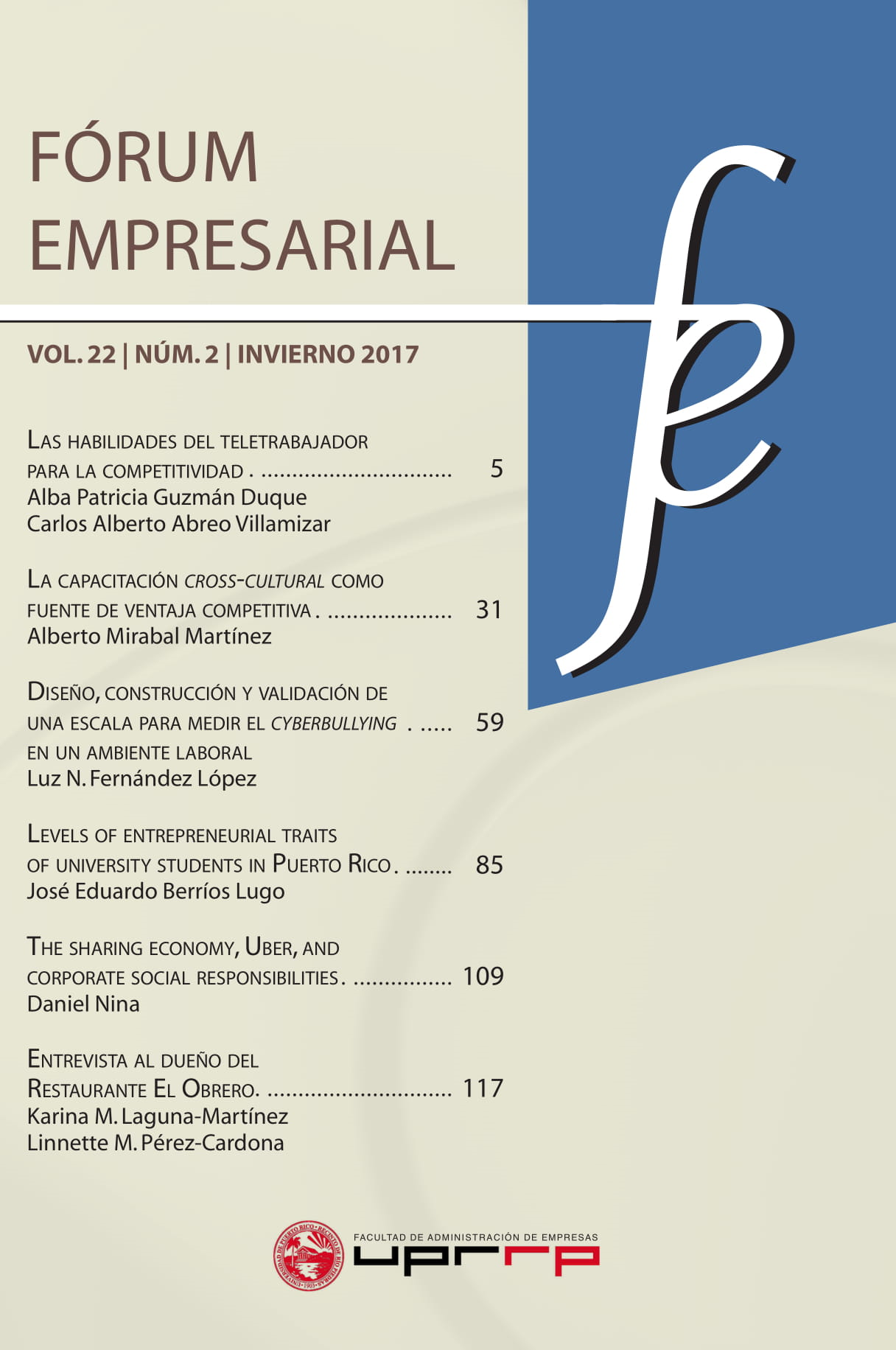Abstract
The objective of this study was to design, construct, and validate a scale to measure cyberbullying in a work environment. The design used was quantitative, not experimental, and transversal. The research method was based on the Reactive Response Theory. This research produced a validated scale with a sample of the work environment in Puerto Rico. Three analyses were performed: content validity, reliability analysis of the Cronbach alpha coefficient, and the divergent type construct validity. Based on the analysis of the results, the scale was deemed to be useful for the purpose it was designed. Building a scale that measures cyberbullying contributes to the design of new instruments and the revision of existing ones; furthermore, it may serve as the basis for future re- search related to the topic of cyberbullying.
References
Álvarez, V., & Pastrana, V. M. (1995). La profesión de la psicología en Puerto Rico. San Juan, Puerto Rico: Centro de Estudios Caribeños.
Castro, M., & Sánchez, J. (2009). Técnicas gerenciales efectivas para reducir el maltrato psicológico, los problemas, sus consecuencias y la violencia en el trabajo. Revista Oikos, 13(27), 51–66.
Colón Bilbraut, J. (2013, marzo 27). Proyecto de Ley "Cyberbullying" en Puerto Rico. [Carta escrita a Sandra Rodríguez Cotto]. Recuperado de http://www.losetodo.wapa.tv/assets/docs/ProyectoCyberbullying.pdf
DeVellis, R. F. (1991). Scale development: Theory and applications. Newbury Park, CA: Sage Publications.
Goldstein, G., & Hersen, H. (2000). Handbook of phychological assessment (3a ed.). Oxford, Reino Unido: Elsevier Science.
Hernández-Sampieri, R., Fernández-Collado, C., & Baptista-Lucio, P. (2006). Metodología de la investigación (4a ed.). México, D.F., México: McGraw Hill Interamericana Editores, S.A.
Herrans, L. L. (2000). Psicología y medición: El desarrollo de pruebas psicológicas en Puerto Rico (2a ed.). San Juan, Puerto Rico: Reprográfica.
Huertas, M. (2008). Estrategias para lidiar con el acoso moral en las empresas. Recuperado de http://www.sistemasdeoficina.com/acosomoral.htm
Kahale Carrillo, D. (2007). El acoso moral en el trabajo («mobbing»): Delimitación y herramientas jurídicas para combatirlo.Revista Gaceta Laboral, 13(1), 76–94.
Kline, P. (2000). A psychometric primer. New York, NY: Free association Books.Lawshe, C. (1975). A quantitative approach to content validity. Per-sonnel Psychology, 28(4), 563–575.
Matas, A. (2010). Introducción al análisis de la teoría de respuesta al ítem. Recuperado de https://tinyurl.com/yxhsb7t9
Mendoza, E. (2012). Acoso cibernético o cyberbullying: Acoso con la tecnología electrónica. Revista Mexicana de Pediatría, 14(3), 133–146. Recuperado de https://www.medigraphic.com/cgi-bin/new/resumen.cgi?IDARTICULO=36726
Privitera, C., & Campbell, M. (2009). Cyberbullying: The new face of workplace bullying? Cyber psychology & behavior, 12(4), 395–400.
Rodríguez-Nieves, E. (2007). El acoso moral (laboral) en el trabajo: Consciencia y desarrollo en Puerto Rico. Revista Empresarial Inter Metro, 3(1), 12–34.
Ruiz, Y. (2001). La evolución de la psicología en Puerto Rico. Recuperado de http://www.colegiomediacion.com/aapsicologiaenpr.htm
Roca, I. (2008). Perspectiva histórica sobre la medición psicológica en Puerto Rico. Revista Puertorriqueña de Psicología, 19,11–48.
Rosario-Hernández, E., & Rovira Millán, L. V. (2001). Escala de deseabilidad social. Material del curso Teoría y Construcción de Pruebas. Pontificia Universidad Católica de Puerto Rico, Puerto Rico.
Smith, P. K, Mahdavi, J., Carvalho, C., Fisher, S., Russell, S., & Tippett, N. (2008). Cyberbullying: Its nature and impact in secondary school pupils. Journal of child psychology and psychiatry, 49(4), 376–385.
Velázquez, J., Millán, F., Colton, M., Cabiya, I., Rodríguez, K., Miranda, Y., Zayas, C., De Jesús, S., Nicolau, S., Velázquez, N., & Fericelli, P. (2006). Una nueva mirada a la psicología en Puerto Rico: Apuntes sobre el estado de un arte. Glossa, 1(1), 1–14.
Watzlawick, P., Helmick, J., & Jackson, D. (1985). Teoría de la comunicación humana (4a ed.). Barcelona, España: Editorial Herder.
By submitting a contribution to consideration of the Editorial Board of Fórum Empresarial, the authors attest that it is an original, unpublished work, which has not been nor will be simultaneously submitted to another journal for consideration and publication; that they are responsible for the work carried out and the content of the article; and they have the corresponding copyrights.
The authors grant the right of first publication of their work to Fórum Empresarial, in any medium and physical and electronic format, including internet. Publication shall be subject to the Creative Commons Attribution-NonCommercial 4.0 International License, which allows third parties to share the work, provided that the author and Fórum Empresarial (as a first publication) are cited.
The journal allows authors to retain publishing rights without restrictions. Authors are able to enter into separate, additional arrangements for the non-exclusive distribution of the journal's published version of the work (e.g., post it to an institutional repository or publish it in a book), with an acknowledgment of its initial publication in Fórum Empresarial.

